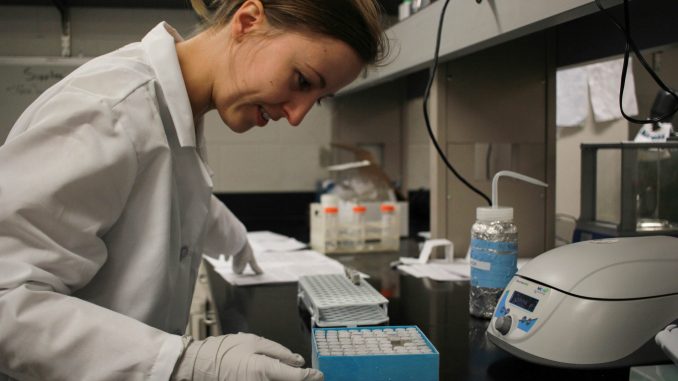
Ever since college, Heather Murphy works to ensure people have access to safe water all over the world.
“I took classes in water quality and water treatment and I got really interested in water safety,” said Murphy, a 2004 biological and environmental engineering alumna from Dalhousie University in Halifax, Canada.
After arriving at Temple University in 2015, the assistant professor in the College of Public Health established the Water, Health and Applied Microbiology Lab, which identifies pathogens like bacteria and viruses in water that cause disease.
The lab inspects Philadelphia’s bodies of water, including groundwater in rural Pennsylvania. It also collaborates with the Philadelphia Water Department to examine the condition of pipes that deliver water to homes. Research fellows and undergraduate, graduate and doctoral students participate in the lab.
“We are looking mostly at combines that overflow, such as the Delaware, Cobbs and Tacony Creeks,” Murphy said. “Although it’s illegal to recreate in those waterways, people are, and it’s a health risk.”
Lab members interview people using the sites for recreational purposes like boating, swimming and fishing to understand how Philadelphians use waterways for leisure.
The WHAM lab also tracks total organic carbon levels, a common measure of water quality that indicates bacterial growth levels. Researchers collect samples at field sites using an ultra-filter, a device that collects pathogens as water runs through it for two to three hours.
Senior biochemistry major Madison Peschen and senior geology major Jessica Serpe, worked at the lab during the summers of 2017 and 2018. The two researched water at sampling sites like Penn Treaty Park, Cobbs Creek and Tacony Creek.
“I’m not the kind of person that would want to stay in the lab for hours on end, so it was nice getting out in the field and interacting with people,” Peschen said.
In addition to testing water in parks, WHAM lab examines water systems in rural areas.
Murphy said rural residents might not know whether they should treat their septic systems, which can affect the quality of well water. The Environmental Protection Agency’s water regulations don’t cover people served by private wells, and some people who rely on small water systems don’t have the resources or capacity to treat their water supply.
Contaminated groundwater isn’t just an issue in underdeveloped countries, but also occurs in developed regions like the United States.
From 2013-14, 42 outbreaks of contaminated drinking water across 19 states caused 1,006 cases of illness, CNN reported. Bacteria commonly found in contaminated groundwater, like E. coli, Salmonella and Shigella, caused infections that resulted in about 400 deadly water-borne disease cases each year from 2003-09.
Philadelphia and most other large U.S. cities, however, consistently deliver safe water to homes. The Philadelphia Water Department showed copper, lead, E. coli and Fluoride levels well below EPA limits in 2017.
“The Philadelphia Water Department does a lot of monitoring,” Murphy said. “They are doing more testing than is required by the EPA.”
But Murphy said some of the pipes delivering water to Philadelphia homes are hundreds of years old, which makes them more susceptible to breaks, especially in cold months. This allows outside materials, like waste from sewer lines, to get into the pipes more easily.
Murphy’s research spans more than just the Philadelphia region. She has consulted on water sanitation and hygiene all over the world, including in Cambodia, India, Madagascar and Mali.
In February 2018, Murphy received funding from the Bill & Melinda Gates Foundation in a collaborative project led by Joan Rose, a Michigan State University professor, to address water sanitation conditions in Uganda and India.
The $1.6 million three-year grant allocated $362,000 to Murphy’s WHAM research.
For Peschen and Serpe, working in the WHAM lab was about more than just water and filters. Participating helped them work toward their future goals.
“I decided that I really do like hydrology,” Serpe said. “If I end up going into environmental consulting, I’ll try to specialize in water.”
The lab work interested Peschen because the work she did now helps people.
“This research is going to be directly applied through the Philadelphia Water Department and EPA, so this research is actually being used in real time to help with overarching health guidelines in Philly,” she said.
Similarly, Murphy said she hopes the science will help others working in the field, and wants to use science to help shape water safety policies. To do so, she aims to grow the number of faculty members researching environmental health at Temple.
“If I can provide the science to move the political agenda to try and address the issues, then my job is done,” Murphy said.


Be the first to comment